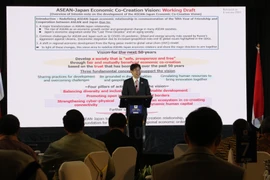Jakarta (VNA) – The ASEAN Secretariat in collaboration with theASEAN-Germany Cooperation Project on Promotion of Sustainable Agricultural ValueChains in ASEAN (ASEAN AgriTrade) organised a regional workshop on the study ondecarbonisation in the agriculture and forestry sectors, in Jakarta on February 23.
In his opening speech, Head of the ASEAN Secretariat's Food, Agriculture and Forestry Division(FAFD) Dr. Pham Quang Minh underlined the sectors’ importance inaddressing the issue of decarbonisation as part of the carbon neutralitystrategy in the region.
As agriculture, forestryand land use has been a major contributor to greenhouse gas emissions, which causesglobal climate change, ASEAN has put the decarbonisation of the agriculture andforestry sectors as one of the key priorities under its cooperation, Minh said.
Florian Miss, PrincipalAdvisor to the ASEAN Agritrade Project echoed that climate change hasbeen a big challenge for the region and has affected the sustainable foodsystem. He welcomed the initiative to move forward with the decarbonisationpathways and supported regional efforts toward that direction.
Participants proposed initial recommendations towards decarbonisation efforts inthe agriculture and forestry sectors, including reducing farms using a lot of chemicals,enhancing efficient utilisation of resources, and promoting sustainable landmanagement techniques.
They also emphasisedthe need to improve agriculture systems’ resilience by minimising unsustainablepractices and promoting sustainable and circular agriculture which includenature-based solutions, ecosystem-based farming approach, and climate-smartagriculture practices.
Other initiatives proposedat the event included enhancement of sustainable forest management andpromotion of reduced emissions from deforestation and forest degradation,fostering of conservation and sustainable management of forests, and enhancementof forest carbon stocks.
The workshop provided anoverview of climate change impacts in agriculture and forestry, greenhousegases emissions from agriculture and forestry, decarbonisation pathways andapproaches, and policy recommendations towards decarbonisation efforts in ASEAN./.
In his opening speech, Head of the ASEAN Secretariat's Food, Agriculture and Forestry Division(FAFD) Dr. Pham Quang Minh underlined the sectors’ importance inaddressing the issue of decarbonisation as part of the carbon neutralitystrategy in the region.
As agriculture, forestryand land use has been a major contributor to greenhouse gas emissions, which causesglobal climate change, ASEAN has put the decarbonisation of the agriculture andforestry sectors as one of the key priorities under its cooperation, Minh said.
Florian Miss, PrincipalAdvisor to the ASEAN Agritrade Project echoed that climate change hasbeen a big challenge for the region and has affected the sustainable foodsystem. He welcomed the initiative to move forward with the decarbonisationpathways and supported regional efforts toward that direction.
Participants proposed initial recommendations towards decarbonisation efforts inthe agriculture and forestry sectors, including reducing farms using a lot of chemicals,enhancing efficient utilisation of resources, and promoting sustainable landmanagement techniques.
They also emphasisedthe need to improve agriculture systems’ resilience by minimising unsustainablepractices and promoting sustainable and circular agriculture which includenature-based solutions, ecosystem-based farming approach, and climate-smartagriculture practices.
Other initiatives proposedat the event included enhancement of sustainable forest management andpromotion of reduced emissions from deforestation and forest degradation,fostering of conservation and sustainable management of forests, and enhancementof forest carbon stocks.
The workshop provided anoverview of climate change impacts in agriculture and forestry, greenhousegases emissions from agriculture and forestry, decarbonisation pathways andapproaches, and policy recommendations towards decarbonisation efforts in ASEAN./.
VNA





























